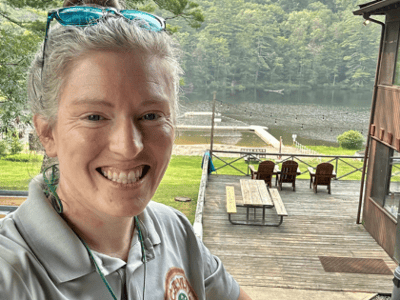Embracing the Journey of Being An Anti-Racist Camp Director
I’ve been the camp director for Camp Jamison for 13 summers, and this summer, I was able to (mostly) sit back and enjoy our campers and staff shine at our annual talent show. There were choreographed Beyonce routines, a Lodge rendition of Golden Hour, and a staff solo of Little Brown Girl. Our campers were surrounded by love and joy from people who looked like them, enjoyed the same music, and knew the same dance moves.
It made me pause and smile, knowing that while the current director of Camp Jamison may be a white lady, I know that won't be the case in the future.
How We Got Here
Let me explain how I got to this moment. This journey started with a dream to create something beautiful, meaningful, and profoundly anti-racist. In 2011, I embarked on an adventure that would forever change my life, leading our inaugural program.
During our first summer, I was a 25-year-old white woman guiding nine campers through Camp Jamison with two counselors. One camper was white, and the other eight were Black. What I didn't know then was that I was starting on a journey of creating a summer camp that would serve hundreds of children from Philadelphia, most of them Black or Brown.
At the core of Camp Jamison is a deep belief that providing all children, especially Black and Brown children, with an overnight summer camp experience is an act of social justice. Summer camp is joyful, and joy is a powerful force, and allowing all children to experience it can be transformative. It can heal wounds, foster growth, and empower future community leaders.
That’s why it’s essential to acknowledge that the systems we operate within in the summer camp world are not different than our outside world. They are not broken but systematically designed to keep out Black and Brown children.
Lessons I've Learned
In 2023, Camp Jamison reached a critical milestone when 75% of our staff were also Black or Brown. We are now a camp of mostly Black and Brown campers AND mostly Black and Brown staff. This combination is hard to find in overnight camps. This happened because the campers grew up and now come back as counselors and leaders.
I want to share some lessons I've learned while on my journey as an anti-racist Camp Director.
Facing the Truth
The first step is acknowledging that racism exists, even within ourselves. Don't shy away from being called out as a racist. Recognize that implicit biases exist, and name them. Taking the sting out of it is essential because someone might eventually call you racist – and that's okay. The path to change starts with awareness.
Giving Space
In the camp setting, giving Black staff and campers the room to have candid conversations without needing a formal debrief is crucial. Trust their judgment and experiences. Sometimes, the most profound growth happens in those unscripted moments of genuine exchange.
Respecting Culture
Our world is full of rich and diverse cultures. Moving beyond empathy to genuine respect is vital. Each community brings its unique perspective and beauty to the table. Celebrate and learn from them.
Curiosity Over Judgment
Approach differences with curiosity rather than judgment. It's perfectly fine not to understand everything. When you're faced with something new or unfamiliar, take the time to research and ask questions. Remember, different isn't bad; it's just different.
Acting on Privilege
Being aware of your privilege and using it responsibly is a significant step. Speak up to other white people, especially at the moment when you witness something that sounds like a microaggression. A simple "What do you mean by that?" can open up important dialogues.
Diverse Perspectives
Understand that the Black experience is not monolithic. Some will connect with you, while others won't, and that's perfectly okay. Embrace the richness of perspectives within the Black community.
Sincere Apologies
Apologies hold immense power. Learn from the Black communities' ability to forgive and grow after conflicts. A sincere apology can mend bridges and pave the way for stronger relationships.
Impact vs. Intent
Taking responsibility for the impact of your actions, regardless of your intent, is a fundamental aspect of anti-racism. Intentions matter, but the effects of our actions matter more.
Respond and Trust
When called out, respond sincerely and work towards resolution. Understand that it's often more challenging for a person of color to approach you with their concerns than it is for you to address them. Trust their experiences and feelings.
Moving Forward
My hope is that with more anti-racist summer camp professionals, we can actively work together to make the world of summer camp more equitable and accessible.
 Jacqueline McDonough
Jacqueline McDonough
Leave a Comment